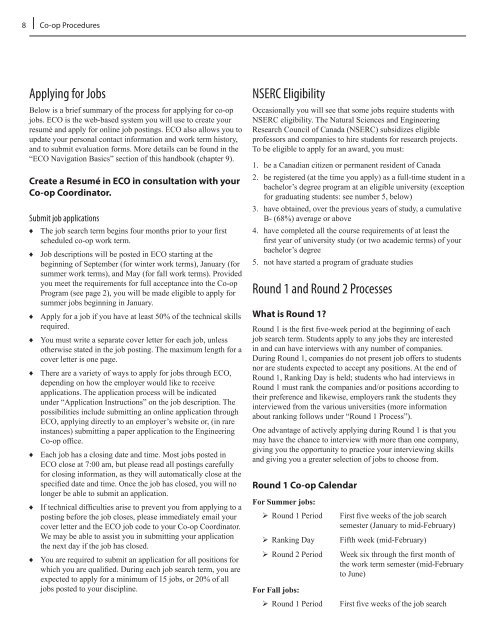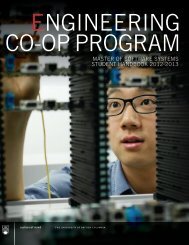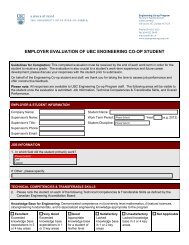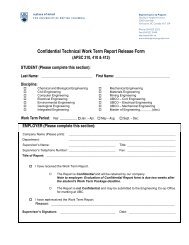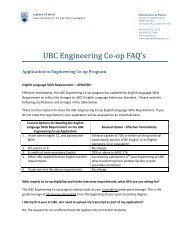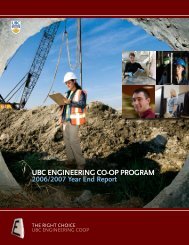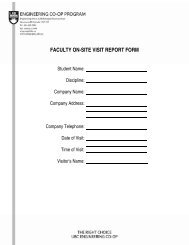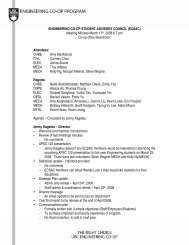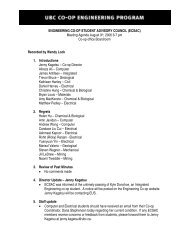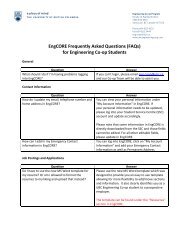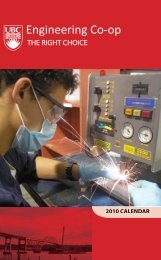ENGINEERING CO-OP PROGRAM
Download - Engineering Co-op Office - University of British Columbia
Download - Engineering Co-op Office - University of British Columbia
- No tags were found...
You also want an ePaper? Increase the reach of your titles
YUMPU automatically turns print PDFs into web optimized ePapers that Google loves.
8 Co-op Procedures<br />
Applying for Jobs<br />
Below is a brief summary of the process for applying for co-op<br />
jobs. E<strong>CO</strong> is the web-based system you will use to create your<br />
resumé and apply for online job postings. E<strong>CO</strong> also allows you to<br />
update your personal contact information and work term history,<br />
and to submit evaluation forms. More details can be found in the<br />
“E<strong>CO</strong> Navigation Basics” section of this handbook (chapter 9).<br />
Create a Resumé in E<strong>CO</strong> in consultation with your<br />
Co-op Coordinator.<br />
Submit job applications<br />
♦♦<br />
♦♦<br />
♦♦<br />
♦♦<br />
♦♦<br />
♦♦<br />
♦♦<br />
♦♦<br />
The job search term begins four months prior to your first<br />
scheduled co-op work term.<br />
Job descriptions will be posted in E<strong>CO</strong> starting at the<br />
beginning of September (for winter work terms), January (for<br />
summer work terms), and May (for fall work terms). Provided<br />
you meet the requirements for full acceptance into the Co-op<br />
Program (see page 2), you will be made eligible to apply for<br />
summer jobs beginning in January.<br />
Apply for a job if you have at least 50% of the technical skills<br />
required.<br />
You must write a separate cover letter for each job, unless<br />
otherwise stated in the job posting. The maximum length for a<br />
cover letter is one page.<br />
There are a variety of ways to apply for jobs through E<strong>CO</strong>,<br />
depending on how the employer would like to receive<br />
applications. The application process will be indicated<br />
under “Application Instructions” on the job description. The<br />
possibilities include submitting an online application through<br />
E<strong>CO</strong>, applying directly to an employer’s website or, (in rare<br />
instances) submitting a paper application to the Engineering<br />
Co-op office.<br />
Each job has a closing date and time. Most jobs posted in<br />
E<strong>CO</strong> close at 7:00 am, but please read all postings carefully<br />
for closing information, as they will automatically close at the<br />
specified date and time. Once the job has closed, you will no<br />
longer be able to submit an application.<br />
If technical difficulties arise to prevent you from applying to a<br />
posting before the job closes, please immediately email your<br />
cover letter and the E<strong>CO</strong> job code to your Co-op Coordinator.<br />
We may be able to assist you in submitting your application<br />
the next day if the job has closed.<br />
You are required to submit an application for all positions for<br />
which you are qualified. During each job search term, you are<br />
expected to apply for a minimum of 15 jobs, or 20% of all<br />
jobs posted to your discipline.<br />
NSERC Eligibility<br />
Occasionally you will see that some jobs require students with<br />
NSERC eligibility. The Natural Sciences and Engineering<br />
Research Council of Canada (NSERC) subsidizes eligible<br />
professors and companies to hire students for research projects.<br />
To be eligible to apply for an award, you must:<br />
1. be a Canadian citizen or permanent resident of Canada<br />
2. be registered (at the time you apply) as a full-time student in a<br />
bachelor’s degree program at an eligible university (exception<br />
for graduating students: see number 5, below)<br />
3. have obtained, over the previous years of study, a cumulative<br />
B- (68%) average or above<br />
4. have completed all the course requirements of at least the<br />
first year of university study (or two academic terms) of your<br />
bachelor’s degree<br />
5. not have started a program of graduate studies<br />
Round 1 and Round 2 Processes<br />
What is Round 1?<br />
Round 1 is the first five-week period at the beginning of each<br />
job search term. Students apply to any jobs they are interested<br />
in and can have interviews with any number of companies.<br />
During Round 1, companies do not present job offers to students<br />
nor are students expected to accept any positions. At the end of<br />
Round 1, Ranking Day is held; students who had interviews in<br />
Round 1 must rank the companies and/or positions according to<br />
their preference and likewise, employers rank the students they<br />
interviewed from the various universities (more information<br />
about ranking follows under “Round 1 Process”).<br />
One advantage of actively applying during Round 1 is that you<br />
may have the chance to interview with more than one company,<br />
giving you the opportunity to practice your interviewing skills<br />
and giving you a greater selection of jobs to choose from.<br />
Round 1 Co-op Calendar<br />
For Summer jobs:<br />
‣ ¾ Round 1 Period<br />
‣ ¾ Ranking Day<br />
‣ ¾ Round 2 Period<br />
For Fall jobs:<br />
‣ ¾ Round 1 Period<br />
First five weeks of the job search<br />
semester (January to mid-February)<br />
Fifth week (mid-February)<br />
Week six through the first month of<br />
the work term semester (mid-February<br />
to June)<br />
First five weeks of the job search


